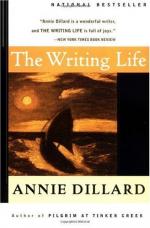
|
| Name: _________________________ | Period: ___________________ |
This test consists of 15 multiple choice questions and 5 short answer questions.
Multiple Choice Questions
1. What, according to Dillard, is the first thing a writer does that is similar to what a painter does?
(a) Shapes a vision of the world.
(b) Shapes the vision of the work.
(c) Brings the vision of the work to light.
(d) Ignores the first faint marks on the canvas or page.
2. What was the result of Dillard's first attempts at splitting wood in Chapter 3?
(a) She cut herself with the axe.
(b) Tiny wedges got chopped off.
(c) She missed the wood every time.
(d) She split fine logs.
3. How did a well-known writer respond to a student in Chapter 5 who asked if he could be a writer?
(a) Do you like sentences?
(b) What do you know about the world?
(c) Have you taken my course?
(d) Do you have imagination?
4. What happened to the Smith-Corona typewriter in Chapter 4?
(a) It erupted with smoke and fire.
(b) The cord sent out sparks.
(c) The rumbling damaged it beyond repair.
(d) It fell from the desk and broke.
5. Dillard repeated the phrase, 'It is the grave of Jesus, where he lay' over and over like a song in Chapter 5. What poem is this line from?
(a) Valley Candle.
(b) Poem Written at Morning.
(c) Sunday Morning.
(d) The Well Dressed Man with a Beard.
6. Why was Dillard's finger in pain at times as she wrote in the university office in Virginia?
(a) Her fingers cramped up from writing for so long.
(b) She had a clothespin stuck to her finger until the water boiled.
(c) She spilled hot water on her fingers once in a while.
(d) She got paper cuts.
7. Where did Willa Cather write her prairie novels?
(a) Wisconsin.
(b) Miami.
(c) New York City.
(d) Kansas City.
8. What did Frederick Buechner note about an author realizing that he is actually writing?
(a) It must go on once it is noticed.
(b) The wood must be split and fired.
(c) The writer should revise what was written.
(d) It calls for a break or celebration.
9. Why does it make more sense to write one big book rather than a collection of stories or essays, in Dillard's opinion?
(a) There is more money to be made with a book.
(b) You can fit all you possess into a long project.
(c) It does not take as long to write one big book.
(d) A cast of characters is easier to work with.
10. Who wrote, 'He goes because he must, as Galahad went towards the Grail; knowing that for those who can live it, this alone is life'?
(a) Henry Thoreau.
(b) Albert Einstein.
(c) Evelyn Underhill.
(d) Wallace Stevens.
11. What does Dillard say that she believes may well be a writer's only firsthand experience?
(a) Travel.
(b) College.
(c) Childhood.
(d) Friendships.
12. How did Dillard's sentence ('He led him into the water') from the book she was working on during a northeaster sound to her?
(a) Powerful.
(b) Clunky.
(c) Rhythmical.
(d) Bright.
13. How does society regard the writer, in Dillard's experience?
(a) WIth adulation.
(b) With fear.
(c) With indifference.
(d) With curiosity.
14. What does Dillard say that she thinks an artist supposes a live image to possess?
(a) Something he should pretend to know.
(b) A confused set of lines.
(c) Some technique stolen from him.
(d) A secret to be discovered.
15. What kept the teakettle that Dillard used in a faculty lounge from whistling?
(a) It was not a whistling teakettle.
(b) An aluminum lid jammed over its mouth.
(c) It was an electric kettle.
(d) The mouth of the kettle was always kept open.
Short Answer Questions
1. What did Dillard study in Chapter 5?
2. What did Dillard learn about herself while talking with the sheriff in Chapter 3?
3. What did Emily Dickinson love best in her writing?
4. In working-class France, what did Dillard say that experienced workers tell an apprentice who gets hurt or tired?
5. Who watched Dillard chop wood every morning in Washington?
|
This section contains 669 words (approx. 3 pages at 300 words per page) |

|




